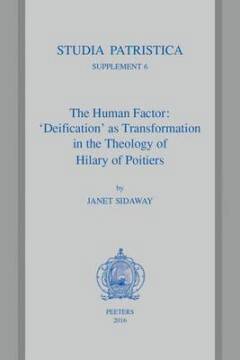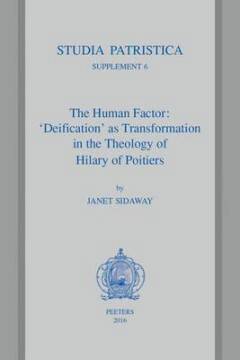
- Afhalen na 1 uur in een winkel met voorraad
- Gratis thuislevering in België vanaf € 30
- Ruim aanbod met 7 miljoen producten
- Afhalen na 1 uur in een winkel met voorraad
- Gratis thuislevering in België vanaf € 30
- Ruim aanbod met 7 miljoen producten
Zoeken
€ 65,00
+ 130 punten
Omschrijving
This study focuses on two significant but overlooked aspects of Hilary of Poitiers' theology: his interpretation of how we 'become God' as individuals, and the originality of his twelve volume De trinitate in expressing it. Janet Sidaway argues that Hilary's ideas had their origin in his baptismal confession of faith and Biblical exegesis, but were then shaped by his response to the 'Arians' and to Marcellus of Ancyra. She illustrates Hilary's emphasis on the soteriological importance of the human nature of the incarnate Christ, and on his brotherhood with us. He interpreted the Transfiguration to reveal Christ's glory as a perfect human being, and suggested that Christ remains in some sense corporeally human after the Ascension. Because we share Christ's human body, we too may share this glory. Dr. Sidaway proposes that, although Hilary's ideas were ignored by his immediate successors, they are similar to the theology of the body formulated by Dante in the Divine Comedy, and resonate with the current concepts of Transformation Theology.
Specificaties
Betrokkenen
- Auteur(s):
- Uitgeverij:
Inhoud
- Aantal bladzijden:
- 155
- Taal:
- Engels
- Reeks:
- Reeksnummer:
- nr. 6
Eigenschappen
- Productcode (EAN):
- 9789042933699
- Verschijningsdatum:
- 14/12/2016
- Uitvoering:
- Paperback
- Formaat:
- Trade paperback (VS)
- Afmetingen:
- 160 mm x 239 mm
- Gewicht:
- 276 g

Alleen bij Standaard Boekhandel
+ 130 punten op je klantenkaart van Standaard Boekhandel
Beoordelingen
We publiceren alleen reviews die voldoen aan de voorwaarden voor reviews. Bekijk onze voorwaarden voor reviews.











